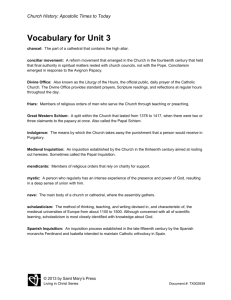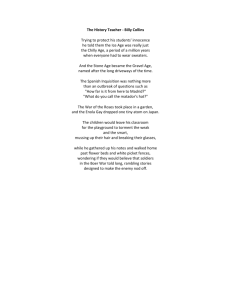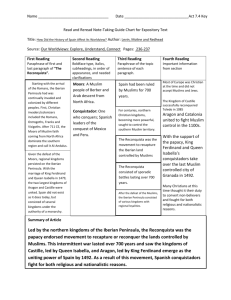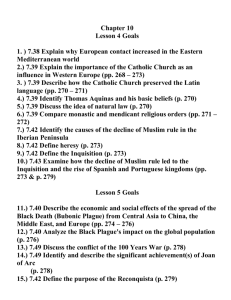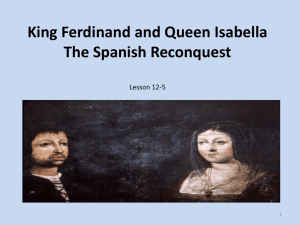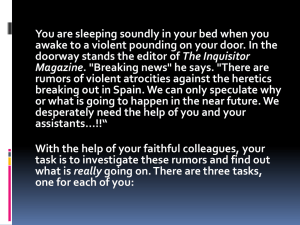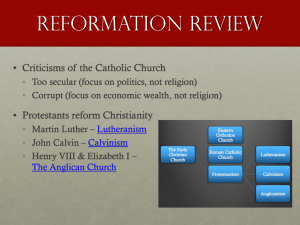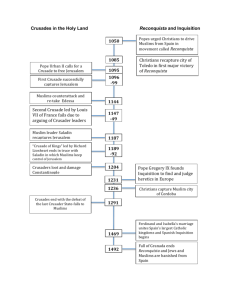LAH/EUH 4930: The Inquisition in Spain and America Wednesdays
advertisement
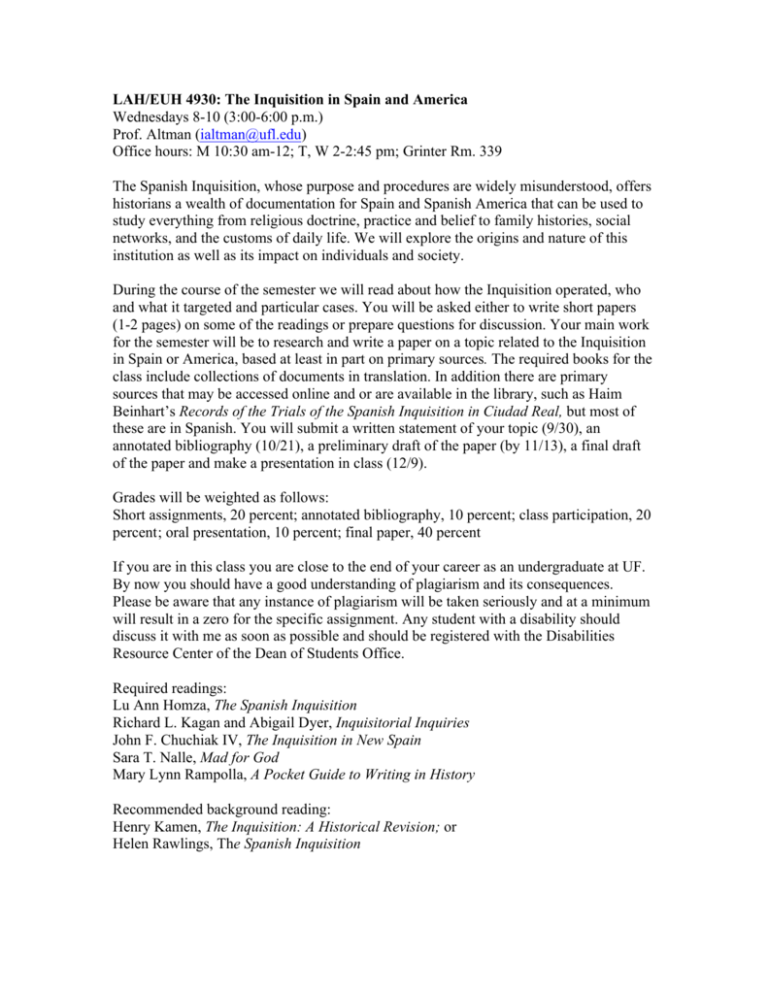
LAH/EUH 4930: The Inquisition in Spain and America Wednesdays 8-10 (3:00-6:00 p.m.) Prof. Altman (ialtman@ufl.edu) Office hours: M 10:30 am-12; T, W 2-2:45 pm; Grinter Rm. 339 The Spanish Inquisition, whose purpose and procedures are widely misunderstood, offers historians a wealth of documentation for Spain and Spanish America that can be used to study everything from religious doctrine, practice and belief to family histories, social networks, and the customs of daily life. We will explore the origins and nature of this institution as well as its impact on individuals and society. During the course of the semester we will read about how the Inquisition operated, who and what it targeted and particular cases. You will be asked either to write short papers (1-2 pages) on some of the readings or prepare questions for discussion. Your main work for the semester will be to research and write a paper on a topic related to the Inquisition in Spain or America, based at least in part on primary sources. The required books for the class include collections of documents in translation. In addition there are primary sources that may be accessed online and or are available in the library, such as Haim Beinhart’s Records of the Trials of the Spanish Inquisition in Ciudad Real, but most of these are in Spanish. You will submit a written statement of your topic (9/30), an annotated bibliography (10/21), a preliminary draft of the paper (by 11/13), a final draft of the paper and make a presentation in class (12/9). Grades will be weighted as follows: Short assignments, 20 percent; annotated bibliography, 10 percent; class participation, 20 percent ; oral presentation, 10 percent; final paper, 40 percent If you are in this class you are close to the end of your career as an undergraduate at UF. By now you should have a good understanding of plagiarism and its consequences. Please be aware that any instance of plagiarism will be taken seriously and at a minimum will result in a zero for the specific assignment. Any student with a disability should discuss it with me as soon as possible and should be registered with the Disabilities Resource Center of the Dean of Students Office. Required readings: Lu Ann Homza, The Spanish Inquisition Richard L. Kagan and Abigail Dyer, Inquisitorial Inquiries John F. Chuchiak IV, The Inquisition in New Spain Sara T. Nalle, Mad for God Mary Lynn Rampolla, A Pocket Guide to Writing in History Recommended background reading: Henry Kamen, The Inquisition: A Historical Revision; or Helen Rawlings, The Spanish Inquisition Week 1: August 26 Origins of the Spanish Inquisition 2: September 2 Procedures and personnel of the Inquisition Lu Ann Homza, The Spanish Inquisition, Introduction; Richard L. Kagan and Abigail Dyer, Inquisitorial Inquiries, Introduction; John F. Chuchiak IV, The Inquisition in New Spain, “The Holy Office of the Inquisition in New Spain (Mexico), An Introductory Study” 3: September 9 Conversos and crypto-Jews Kagan and Dyer, Inquisitorial Inquiries, chs. 1, 4, 6; Homza, The Spanish Inquisition, Documents 5 and 6; Chuchiak, The Inquisition in New Spain, pp. 235-256 4: September 16 Moriscos, alumbrados and Protestants Homza, The Spanish Inquisition, Documents 11, 12, 22, 23; Chuchiak, The Inquisition in New Spain, pp. 257-291; Kagan and Dyer, Inquisitorial Inquiries, ch. 5 September 23, no class (Yom Kippur) 5: September 30 Heresy and blasphemy Homza, The Spanish Inquisition, Documents 14-16, 25; Chuchiak, The Inquisition in New Spain, pp. 205-217 Discuss topics in class and submit a written statement 6: October 7 Witchcraft, magic, sexuality and crimes against matrimony Kagan and Dyer, Inquisitorial Inquiries, ch. 2; Homza, The Spanish Inquisition, Document 13; Chuchiak, The Inquisition in New Spain, pp. 218-227, 230-234, 292-303, 308-314 Ruth Behar, “Sex and Sin, Witchcraft and the Devil in Late-Colonial Mexico,” American Ethnologist 14:1 (February 1987), 34-54 7: October 14 The complicidades of the 1630s and 1640s Stanley Hordes, “The Inquisition as Economic and Political Agent: The Campaign of the Mexican Holy Office against the Crypto-Jews in the Mid-Seventeenth Century, The Americas 39:1 (July 1982), 23-38; and Irene Silverblatt, “New Christians and New World Fears in Seventeenth Century Peru,” Comparative Studies in Society and History 42:3 (July 2000), 524-546 Guest discussion leader, Brian Hamm 8: October 21 Social control and clerical discipline Homza, The Spanish Inquisition, Document 18, 19, 24; Chuchiak, The Inquisition in New Spain, pp. 110-121, 318-335 Annotated bibliographies due 9: October 28 Madness and the Inquisition Sara T. Nalle, Mad for God 10: November 4 Torture, punishment, imprisonment and spectacle Chuchiak, The Inquisition in New Spain, 122-185; figures following p. 201; Homza, The Spanish Inquisition, Documents 21, 26 November 11, no class (Veterans Day) First draft of papers due by Friday, November 13 at noon 11: November 18 Individual meetings to discuss paper drafts November 25, no class (Thanksgiving holiday) 12: December 2 Defending the Inquisition Michael Voris and real Catholic TV 13: December 9 Class presentations and final papers due
